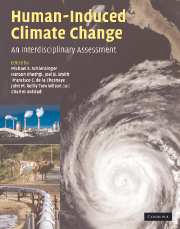Part I - Climate system science
Published online by Cambridge University Press: 06 December 2010
Summary
Introduction
The Earth sciences form core disciplines contributing to the interdisciplinary assessment of human-induced climate change. Assessment exploits understanding gained from the huge, ongoing scientific endeavor to better understand the climate system as well as from interdisciplinary research to better understand how the climate system interacts with human activities. The behavior and response of the Earth system defines the links between human activities influencing the climate system, and climate system influences on society. Papers in this section provide examples of research and review of the analysis and modeling of the Earth system, and the application of such models to provide a framework to address questions associated with the following three sections of this book: impacts and adaptation, mitigation of Greenhouse gases, and policy design and decisionmaking under uncertainty.
This section examines key issues relevant to our ability to forecast future climate, construct and test models of the Earth system for use in integrated assessment, characterize uncertainty in forecasts, and analyze illustrative cases of interactions of human activities with the climate system. While the specific topics addressed in this section are hardly comprehensive, they do give examples of how interdisciplinary studies have not only drawn from fundamental understanding generated by the Earth sciences, but have also contributed to better understanding of the research needs to address societal questions and have begun to carry out this research in conjunction with specialists. Such interaction is leading to the continued and rapid advance of integrated assessment research.
- Type
- Chapter
- Information
- Human-Induced Climate ChangeAn Interdisciplinary Assessment, pp. 1 - 4Publisher: Cambridge University PressPrint publication year: 2007



